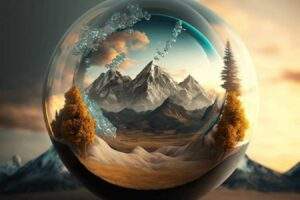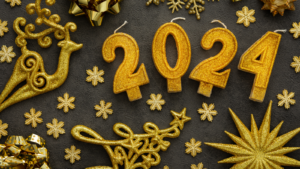
AI-generated image created by Midjourney using the prompt: The Future of Creativity.
It was science fiction writer and futurist Arthur C. Clarke who suggested almost 60 years ago, that “The most intelligent inhabitants of that future world won’t be men or monkeys… they’ll be machines. The remote descendants of today’s computers. They will start to think and eventually they will completely out-think their makers.” He goes on to say “I suspect organic or biological evolution has about come to its end. And we are now at the beginning of inorganic or mechanical evolution which will be thousands of times swifter.”
Now, are these the ramblings of a man whose very purpose was to question societal conventions and attempt to predict our future, or is the possibility, and dare I say, the “reality” closer than we think? Generative Artificial Intelligence (AI) may be the start of this progression and is expanding rapidly as developers find new uses for it.
Certainly, AI’s spread like a brush fire through the literary field and, clearly the uses for this are endless when it comes to eliminating everyday tasks from one’s workload. Fair enough. We’re not all writers nor do we all enjoy writing. And I’m all for eliminating monotony from our lives. But it’s now being utilized to generate imagery, whether it be for fine art or other visual design disciplines. The technology has been used to mimic the paintings of the great masters, and can develop logos and graphic images with minimal verbal prompts. It has also recently entered the audio field as it’s being used to not only write lyrics, but provide the audio for songs that mimic the voices of well-known performers.
One can now enter the words “Picasso” and “disfigurement” into the dialog prompt for any number of these apps to create a computer-generated Picasso-like image. Okay, perhaps that’s a bad example and AI was not really required in this instance, but hopefully the point’s been made.
It’s also my understanding you can input information like “John Denver” and “toenail fungus” to a musical AI app equivalent and lo and behold, Mr. Denver’s voice and musical stylings will be a spot-on reproduction, much to the delight of podiatrists everywhere! All joking aside, are these the directions we “should” be taking with this new-found technology and its untapped potential, good or bad?
What does this all mean for business? What affect might AI apps have on those individuals in the creative fields? Do we not owe it to artists in every discipline to maintain a certain level of integrity and respect for the work they’ve produced? After all, since they’re the creators of much of what’s used on AI to begin with, how do they receive payment or recognition for their efforts?
How can we believe what’s real and what’s simulated? Admittedly, I utilize what one could consider an early adopter of AI in my day-to-day work where photographic images can be enhanced and modified through programs like Photoshop. Apparently, the developers of these new applications have taken it a step further and programmed algorithms with the ability to generate imagery with minimal, simple verbal prompts using a database of images. From a graphic design standpoint, one can enter a business name, the service or product the business provides, maybe an idea for an icon, symbol or image, minimal text suggestions, and… instant logo, brochure, poster, etc. This all might justifiably seem like an economical solution for many people, but the possibility also exists that others have entered identical info to the prompt and received a similar visual. From a branding standpoint where unique and individualism is king, repetition is the court jester wearing a “redundancy” cap.
Certainly, if the technology is used primarily to eliminate mundane, less enjoyable day-to-day tasks that we all have, perhaps this technology should indeed be accessed for such work. This would hopefully allow for time better spent solving the problems of the world. Growing better, more nutritious food, curing disease, as well as eliminating poverty, crime, abuse in any form, etc.; making society happier, healthier and more useful. That may be the ultimate appeal of AI, but where does the line get drawn?
Perhaps guidelines for its use need to be written into corporate and government policies that include fact checking, copyright infringement and transparency. At its core, AI is vulnerable to decisions that can be inaccurate, discriminatory, provide a certain level of bias, and lack objectivity. Ironically, those are also human traits. Maybe the very people who are developing these technologies should be required to provide credit, payment and transparency to those whose ideas, text, imagery and voices have been “accessed”, then royalties paid. But who do we task with regulating less appropriate activity, and does that represent a new form of censorship?

AI-generated image created by Midjourney using the prompt: The End of Civilization.
The text, images and sounds used by the algorithms to generate copy, visuals and sound have to originate somewhere, which brings with it ethical concerns. Since many of these “building materials” were originally created by actual humans, without some form of payment, much of that produced by AI could be deemed as theft, if not copyright infringement. Perhaps lawyers will be the ultimate beneficiary of the ongoing conflict that this is sure to produce.
And how a particular AI model is built and who benefits from its use are often complex issues, and not particularly clear at this stage. Ultimately, we all have to use these tools in a responsible and ethical manner.
Visual and verbal “truth” should be the ultimate goal, but AI is a powerful tool for those who might believe otherwise.
Although generative AI can’t “currently” compete with the soul, emotion, or adaptability of its human counterparts, at least not in the creative arena of copy, imagery and music, it may only be a matter of time. Indeed, there are clearly a lot of questions still to be answered as the technology evolves. Let’s hope society can get a handle the responsibilities, effects and ethics surrounding the positive and beneficial uses for AI. Do we really want to polish the crystal ball of Arthur C. Clarke?
So, should it be of concern that we’ve all become so dependent on the internet/technology “machine”, that we’re merely one mad, disgruntled app developer away from a complete shutdown? We just survived a global pandemic. Can we also survive a technology collapse hot on its heels or down the road? Not to sound alarmist, but this is all scary stuff. I wish and hope someone has the answers.
By the way, this article was NOT AI generated!! Or was it? ;–)
Side Note: Even before completing this article, it came to my attention that AI is now populating the media with AI generated “news” websites containing generated articles on politics, entertainment, science, health, finance, etc… and with all the algorithm assisted, personalized-for-you ads that go with it. The technology treadmill is operating at a sprinters speed, and it’s becoming extremely hard to keep up.
Robin Albright
Senior Advisor
Additional reading, with no guarantee it wasn’t AI generated!
https://www.theglobeandmail.com/business/article-artificial-intelligence-chat-gpt/



